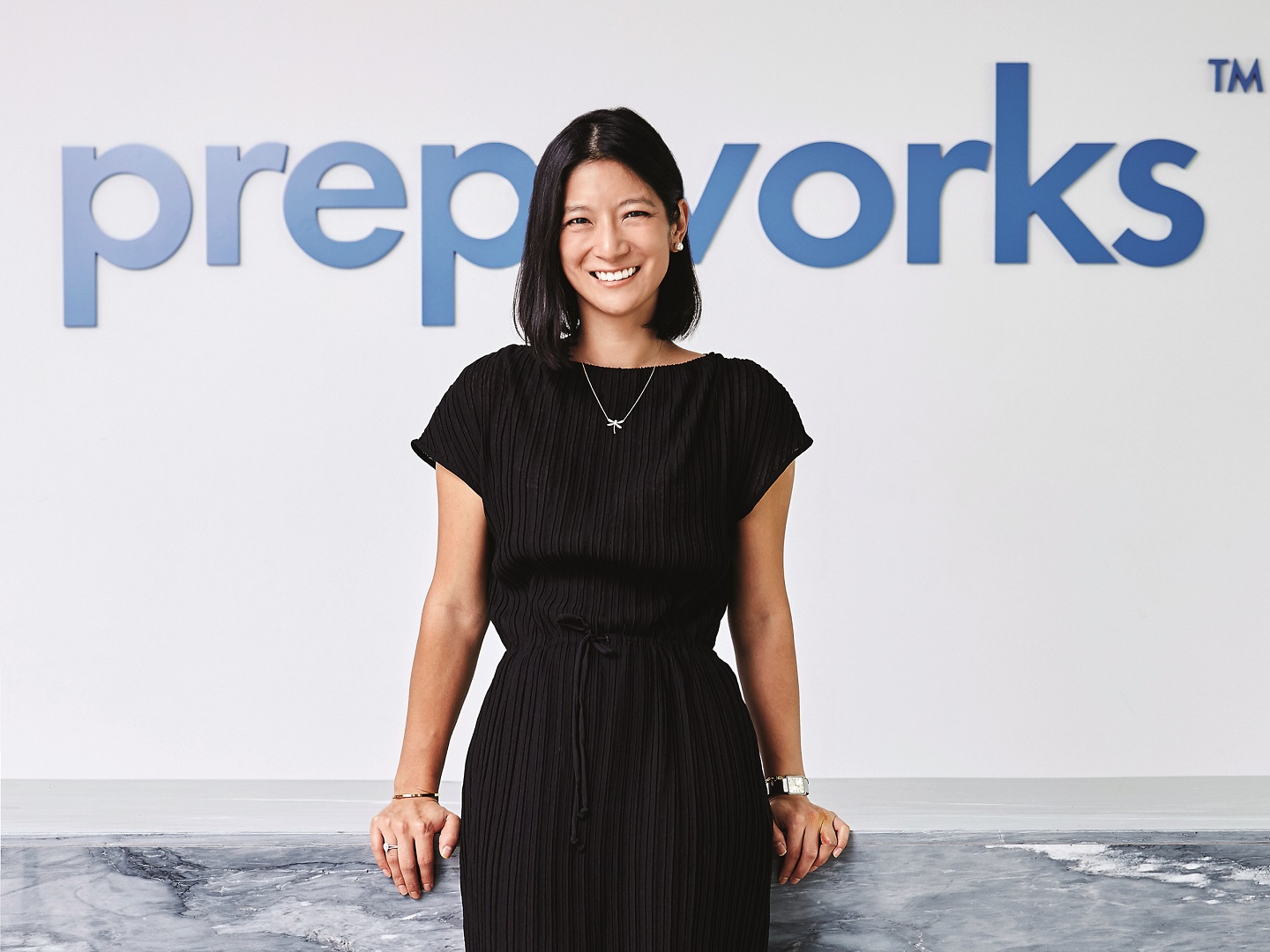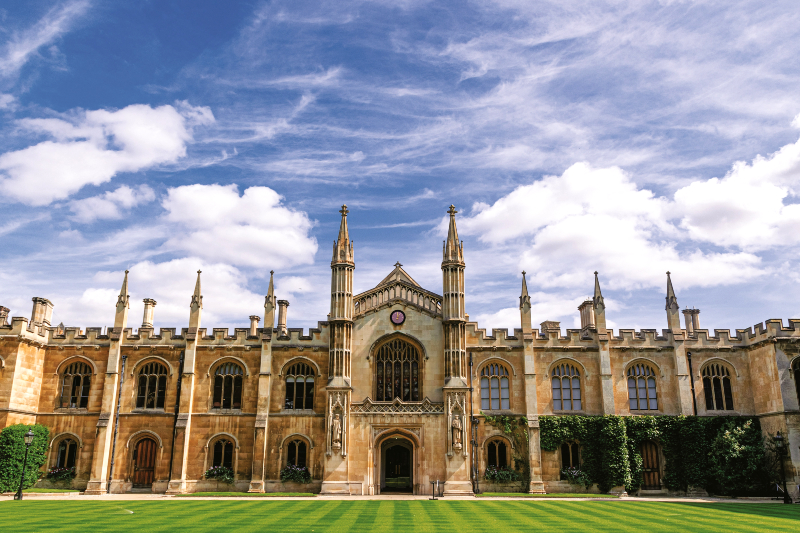
An Oxford alumnus herself, Lim understood the pressure of high-stakes interviews (Photo: Soophye)
Gaining entry into any of the world’s top universities is a dream for many. Apart from the undeniable prestige and opportunity to learn from the best minds amid marvellous surroundings, the sites and settings of many great institutions of higher learning have been immortalised in Hollywood movies such as Chariots of Fire and Shadowlands (University of Cambridge), Harry Potter and X-Men: First Class (University of Oxford) and even, well, Legally Blonde (Harvard Law School).
Cambridge has had poetry penned in its honour by none other than William Wordsworth, who studied at St John’s College from 1787 to 1791, while Duke Humfrey’s Library, the oldest reading room in Oxford’s Bodleian Library, is a treasure trove of ancient manuscripts set within dark and dreamy wooden interiors dating back to the 1400s that lucky students may still use today.
Across the pond, the historic University Hall at Brown in Rhode Island, the US, once served as barracks and a hospital for American and French troops during the Revolutionary War while Yale University, besides its impressive Gothic-style architecture that sets it apart from other campuses, is also known, should one have the curious inclination to pursue it later on in life, as a feeder school for those aspiring to a career with the Central Intelligence Agency.
But beyond the gloss, there is undoubtedly gravitas. A student at any of these plum places of education is assured of keeping good company. The alumni of the world’s top universities, after all, reads like a veritable roll call of legends. Over 40 British prime ministers were Oxbridge graduates while the Massachusetts Institute of Technology, which has retained its position as best university in the world for the 10th consecutive year, can count a mixed but marvellous bag of changemakers that includes Kofi Annan, Buzz Aldrin and I M Pei.
oxford_2_oxford_1.jpg

MAKING A CHOICE
“My overall takeaway from my years in university is that I had never been pushed so much to my academic limit,” says PrepWorks founder and Oxford alumnus Tamara Lim, 37. “If my brain were a balloon, it would have blown up. And now, after the air is let out, it’s not the same shape anymore. But that is a good thing as it was not so much about the knowledge retained that was valuable, but the detail and numerous perspectives from which one can think about a problem that has stuck with me. It is the logical processes you use to tackle problems that take you beyond university.
"Apart from studies, there was also the irreplaceable feeling of freedom and awe of being in an academic Disneyland, as some of my friends described it. Seeing how beautiful and unique it was to study in the oldest university in the [English-speaking] world, from the grandiose libraries to the many Nobel Prize-winning and humanity-impacting discoveries and creations that went on in such a place, and the fact you were living within it, all the while being tutored by world-class leaders, never got old.”
Choosing Oxford over Cambridge after visiting both as she preferred the smaller quads and more intimate environment of the Oxford-size colleges, another factor that guided her decision-making was “how they split the sciences into categories whereas Cambridge had the overarching natural sciences. But most importantly, Oxford offered materials science, which Cambridge didn’t. Chemistry was my favourite subject but I did not want to abandon physics and maths. Besides, I loved the applied side of the sciences, so this degree offered the perfect combination at the time”.
julius_dudenas_unsplash_1.jpg

THE HARD ROAD IN
Reality, more often than not, steps in to nip many a young person’s dreams in the bud. The fiercely competitive nature of entering top institutions of higher learning is not to be taken lightly and is something Lim knows from experience. “When I applied to Oxford, I engaged a company in London as prep for the interviews. They asked me a couple of things such as, “Why do you want to come to the University of Oxford?”
"But I was misled, as the real interview posed no such questions. Instead, we dived straight into academics, dealing with physics, maths and other articles I may have read about materials science. That certainly caught me off guard and I realised I had left two crucial areas — degree selection and interview preparation — very much to chance, at which time reduced me to a pile of nerves,” says the MEng (Hons) holder.
For someone so clearly intelligent and overachieving, it is startling to note that Lim found the admissions experience nerve-wracking. “When the admissions tutor asked if I had had a cup of tea this morning, I was taken aback. It was the opening question. I didn’t drink tea. He then asked if I had had a cup of coffee. But I didn’t drink coffee either. He was a little more impatient now and he asked what I drank for breakfast then, to which I answered “Milo”.
What followed was him asking how much energy it takes to heat the water for my cup of Milo and start from first principles by drawing a waterfall,” Lim laughs. “I must confess to being completely taken aback. And similar to our current situation with Covid-19, it was hard to grapple with the uncertainty of where this question was leading to. But he guided me through as I drew the waterfall, estimating the gravitational potential energy onto it being converted into kinetic energy through a hydroelectric power station, then onto the power grid before being delivered to our electrical socket where the water in a kettle could be heated to make the said cup of Milo.
"Throughout all this, I had to churn out physics equation after physics equation, namely to do with energy conversions, as well as many estimations such as how high a waterfall is. At the end of the day, it turned out enjoyable and I can tell you it was a relief to finally arrive at the answer with my interviewer’s help! But it was also the first time in my life when I did not know how to prepare for such a high-stakes scenario,” she admits.
“And I was the type who always over-prepared — to the point that if I was asked a three-mark question, I would give five points, two for insurance. I was sent to boarding school at age 13, so I had the ingrained belief I was being put through adversity, 8,000 miles away from home in a place I did not want to be in, to get the grades and be accepted into either Oxford or Cambridge. In a way, it was my ultimate mission: to get in.”
LENDING A HAND
A decade on, memories of the high-stakes interview and application process came flooding back when Lim, then working in the commercial oil and gas sector, was helping a couple of her parents’ friends out with their personal statements. “This is another key stage of the university application process,” she says.
“Their personal statements had little similarity to the ones I read that had actually won the person a spot in a top university. But what concerned me more was that they mentioned it was upon someone else’s advice. It was then that I decided a service like PrepWorks was much needed to ensure students are on the correct path towards their closest matched dream degree.
“I also extended it to include my experience and the hurdles one had to go through when applying to competitive boarding schools in the UK, from personal statement writing to entrance exams and interviews. It is not dissimilar to university, but just adjusted for age. I really felt this was an area I could contribute to Malaysian and Southeast Asian society, in pulling together talents who have first-hand experience and a background in coaching students towards competitive university entry ... so that they are more prepared and have an overall higher chance of getting in!”
Those undaunted by Lim’s recollections and who feel their children would thrive under the challenge of A-List academia, would definitely not fail to appreciate how a little nudge and extra help could go a long way indeed in helping their little Einsteins achieve their dreams, be it personal or parental.
PrepWorks was established in 2015, first along the old Asian Heritage Row just off Jalan Sultan Ismail, Kuala Lumpur. But it has since relocated to the well-to-do neighbourhood of Taman Tun Dr Ismail and expanded its services to include the PrepWorks Method, an approach that focuses on equipping children with the means to succeed — in short, character and skills development to complement their academic development in order to excel.
Lim has more than 100 part-time tutors on her roster, with most boasting Oxford, Cambridge or Ivy League backgrounds like herself. “Our services include developing the skills we believe will set up students for success, including critical thinking, studying skills, mindfulness and public speaking,” she explains.
WHO SHOULD ATTEND?
Any child aged between five and 17 may benefit from PrepWorks: the younger ones attend the after-school programme of English, Bahasa Melayu, maths and science while the older ones have regular one-on-one tutoring in academic subjects and skills enrichment classes. Those 15 and above may start early Oxbridge or Ivy League preparation programmes.
“We have established an online Primary Academy as an academic-boosting after-school programme, to help ensure students don’t fall behind during lockdown as well as supplement their regular schooling while exposing them to the PrepWorks methodology. The kids loved it as it is very interactive and stimulating, and we covered the whole UK National Curriculum for Year Group 2, 3 and 4, from March to December 2020, complete with assessments and reports,” says Lim.
To the unfamiliar, the PrepWorks Method is the foundation upon which a student’s success may be set up, encompassing academics and skills and character development.
“A student would need to excel in all three to be successful in her endeavours. It is to highlight that if you want to reach places such as Oxford, Cambridge or Harvard, they not only look at good grades. You must be able to critically think on the spot, present yourself well and have characteristics such as diligence, self-awareness and perseverance. Excelling in these areas enables you to walk the harder but ultimately more rewarding path,” says Lim.
Some highlights of PrepWorks’ six years in operation include, of course, seeing its students get into the universities of their dreams. “In our first year, we had a success rate of one out of three students while also helping a school increase its Oxford and Cambridge University entrants from nought to three,” she shares.
PrepWorks’ business has grown primarily through word of mouth, with happy clients spreading the word of their positive experiences. “We also conducted many talks, began a key partnership with HSBC Premier Malaysia as its official education advisers and invested in digital marketing,” she adds.
It is Lim’s students, however, who remain her best calling card. “Some recently got into Harvard, Yale, Princeton and UC Berkeley as well as Cambridge,” she beams. “Four years ago, I had a student who, at the last minute, needed a place at a medical school in the UK. As perfect timing goes, I knew of a university that had underestimated its quota. They were a perfect match and the student just graduated this year, as updated by his father.
"To know that this student’s life was changed because PrepWorks existed is something that keeps me going. Another memorable moment was when the parents of one of our students from Bintulu asked me to keep running the online Primary Academy because his daughter enjoyed it so much and she had no other avenue of learning, as the international school [nearby] recently closed down and she could not learn in the local school’s Malay language curriculum. Additionally, in 2019, two out of three of our students got into Oxford and Cambridge — that was certainly a great moment.”
THE FUTURE OF EDUCATION
With Covid-19 throwing a monkey wrench into student life as a whole, Lim says some of the major impacts would be the oversubscription of university places as a result of exams being cancelled and teacher-assessed grades being more positive than the examination outcomes they replaced. “Harvard was at an all-time low in terms of acceptance, with a rate of about 3.43%. But parents remain hopeful of getting their children in, so it’s pretty much business as usual — just much, much harder for entry, so they need all the help they can get,” she points out.
“From a business standpoint, we had a positive outcome albeit having a lot of work to do, moving all our operations and tutoring online. We also expanded to other countries while delivering service from Malaysia. Our Primary Academy has attendees from China, Cambodia and New Zealand, and we have just opened an office in Singapore to service our clients there. The forced acceleration to adopt technology has also opened our eyes to what other e-tools we could develop to improve applicants’ chances of reaching the top universities.”
Other issues Lim foresees would be an over-competitive landscape. “University acceptance rates generally reduce every year due to overpopulation, not to mention having more hoops to jump through. I mean, back in my day, there were no entrance exams, just the admissions interview. With the pandemic disrupting the entry process, I am concerned that some students’ applications will not be treated as fairly compared with a normal year, although I am hoping this will all normalise over the next two to three years.”
Another potential bump in the road is the worry that student life will never be the same again. “Amid concerns of the virus spreading, students may have to attend lectures online and be more vigilant during social events, which is ironic, as university is meant to be one of the freest times in one’s life,” she sighs. “There is also a lot of disruption when it comes to sitting for exams. A lot of test dates for SATs were cancelled last year and US colleges had to adjust their entry requirements on whether to include SATs or not. There is still much uncertainty with changes in process ongoing for a while.”
One other disruption comes in the form of courses created by Big Tech, such as Google’s new Career Certificates, a selection of professional courses that take just half a year to complete at a fraction of the cost of a traditional degree. But Lim is confident in the staying power of a top-level university education.
“A lot of us, although in the 21st century, are still quite traditional at heart. We may go on about how technology can help us but it also hinders us, which is why even the tourism industry is veering back towards nature, less screen time and more mindfulness. To obtain a degree online ticks a box and is, of course, an achievement but I am hesitant to say it will replace the full university experience as there are other areas of personal development one obtains from attending university, well beyond the lectures and hard content.
“I believe a good university education will always be worth pursuing, mainly because it opens many more doors of opportunity in terms of a global career. Many say you don’t need a degree to be successful, which is partly true, but at the end of the day, you shouldn’t limit your options to just, say, starting up your own business, a risk in itself.
"University is also more than a degree; it is an experience best shared, and you will never lose that bond with those you shared it with. An A-List college, in particular, will also expose you to world-class lecturers and allow you to attend conferences and meet people you wouldn’t otherwise meet while being a part of teams of like-minded peers who are extremely intelligent and inspirational, people with a contagious appetite to stand for noble causes or even change the course of mankind one day.
"A small turn like this, early on in one’s life, the exposure, the experiences, could well make a big difference down the road, affecting the decisions one makes and the perspectives one takes.”
A mother to three young children herself, Lim’s hopes for them are simple but profound. “I wish they will grow up confident in persevering towards their areas of interests and strengths, finding an environment in which they thrive, not just survive, and I hope that will be in a place where they can be challenged to do their best and reach their fullest potential.”
She then shares a parting nugget of wisdom she picked up while at Oxford: “If you think you can or if you think you can’t, either way you are right. Graduating taught me “I can”, simply because my final exams felt insurmountable. Also university is the best training ground to learn how there is always room to have fun and find the humour and awe in life, regardless of its challenges.”
This article first appeared on Aug 2, 2021 in The Edge Malaysia.


